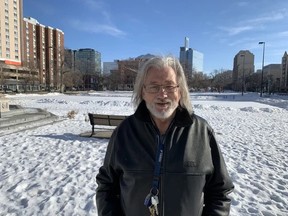
Article content
A long-time advocate for Winnipeg’s homeless has serious concerns about Manitoba’s new strategy to fight homelessness, in part by taking people out of encampments, because he’s worried some simply won’t leave when they’re asked to.
Advertisement 2
Story continues below
Article content
Article content
Recommended Videos
Article content
“The main challenge is, what if folks do not want to move? Then will they force them to leave, creating a human rights issue?” Al Wiebe said on Wednesday, one day after the province introduced the Your Way Home strategy, that will look to end chronic homelessness and end the use of homeless encampments in Winnipeg.
The strategy will see the province work with the City of Winnipeg on a 30-day timeline that will see the government move “one encampment at a time” into housing, including what the province said is 300 new social units that have been purchased and will be supported by non-profit organizations.
The province is also promising that encampments will only be moved once move-in ready housing is secured for every person.
Article content
Advertisement 3
Story continues below
Article content
The sites will then be decommissioned and cleared by clean-up teams, and once cleared will be monitored by foot patrols to ensure the space remains cleared and no new encampments pop up, the province said.

But Wiebe, who spent years of his own life living on the streets while dealing with mental health and addiction issues, believes the plan could hit some serious snags very early on, because depending on what people at encampments are dealing with, they may not want to leave, and may not want to be transferred to the housing the province said they will provide.
“I’m sure many will not want to leave,” Wiebe said. “And then what? Will force be used?”
Wiebe added many who live in encampments deal with a combination of serious mental health and addiction issues.
Advertisement 4
Story continues below
Article content
Wiebe also worries about the effectiveness of putting all encampment residents in housing, because he said depending on how badly they are struggling, they could still end up back on the streets and might not even be able to function in the provincial housing.
“I think many will be back on the street soon,” Wiebe said. “Housing is not for everyone, and the mental health issues are very real.”
The province says along with an initial $20 million investment, there will be additional wraparound support and funding provided, which will include flexible funding for people who are experiencing incidental homelessness to help ensure a “successful transition into housing.”
The co-ordination of the new strategy will be led by Tessa Blaikie Whitecloud, the premier’s new senior advisor on ending chronic homelessness. Whitecloud has worked in the homeless-serving sector since 2013, previously as the executive director for 1JustCity and for the last three years, as the CEO of Siloam Mission.
Advertisement 5
Story continues below
Article content
The province says the new strategy builds on Budget 2024’s investment of more than $116 million for the construction and upkeep of social and affordable housing. As part of this funding, the Manitoba government is building 350 new units of social and affordable housing and renovating and repairing another 3,000 units.
— Dave Baxter is a Local Journalism Initiative reporter who works out of the Winnipeg Sun. The Local Journalism Initiative is funded by the Government of Canada.
Have thoughts on what’s going on in Winnipeg, Manitoba, Canada or across the world? Send us a letter to the editor at wpgsun.letters@kleinmedia.ca
Article content
Comments